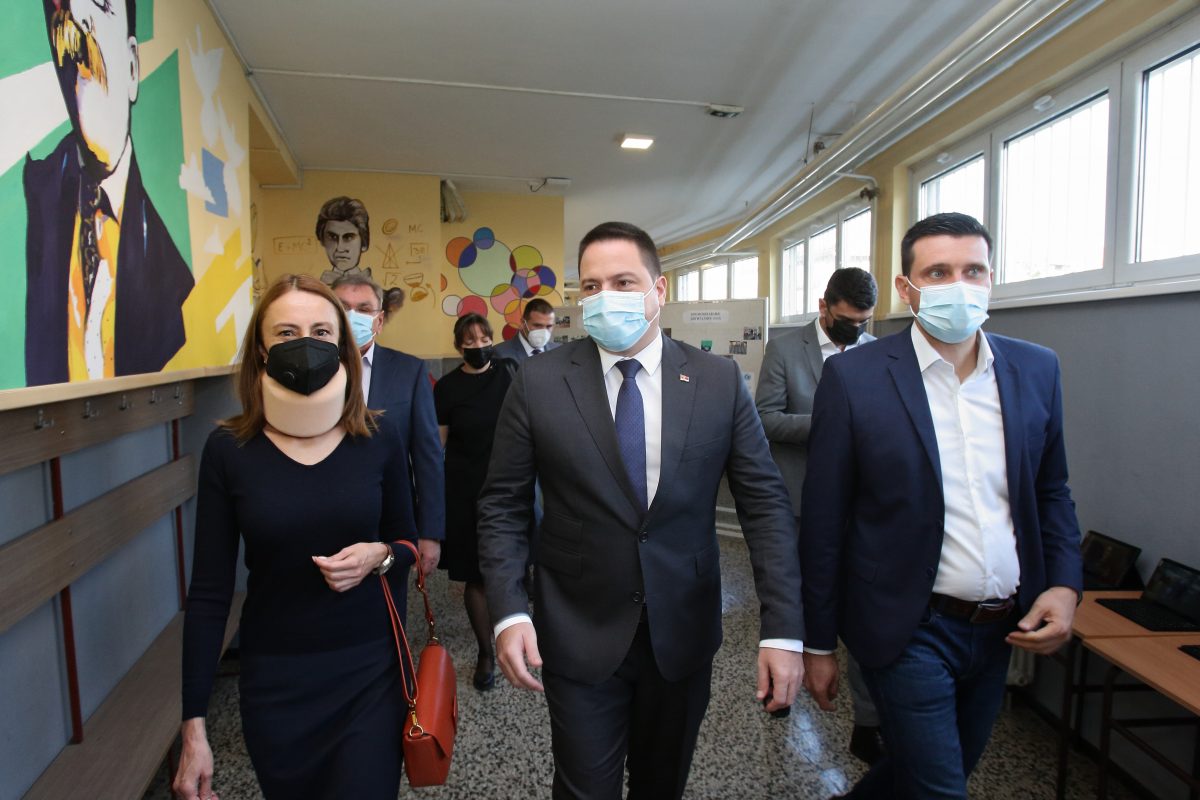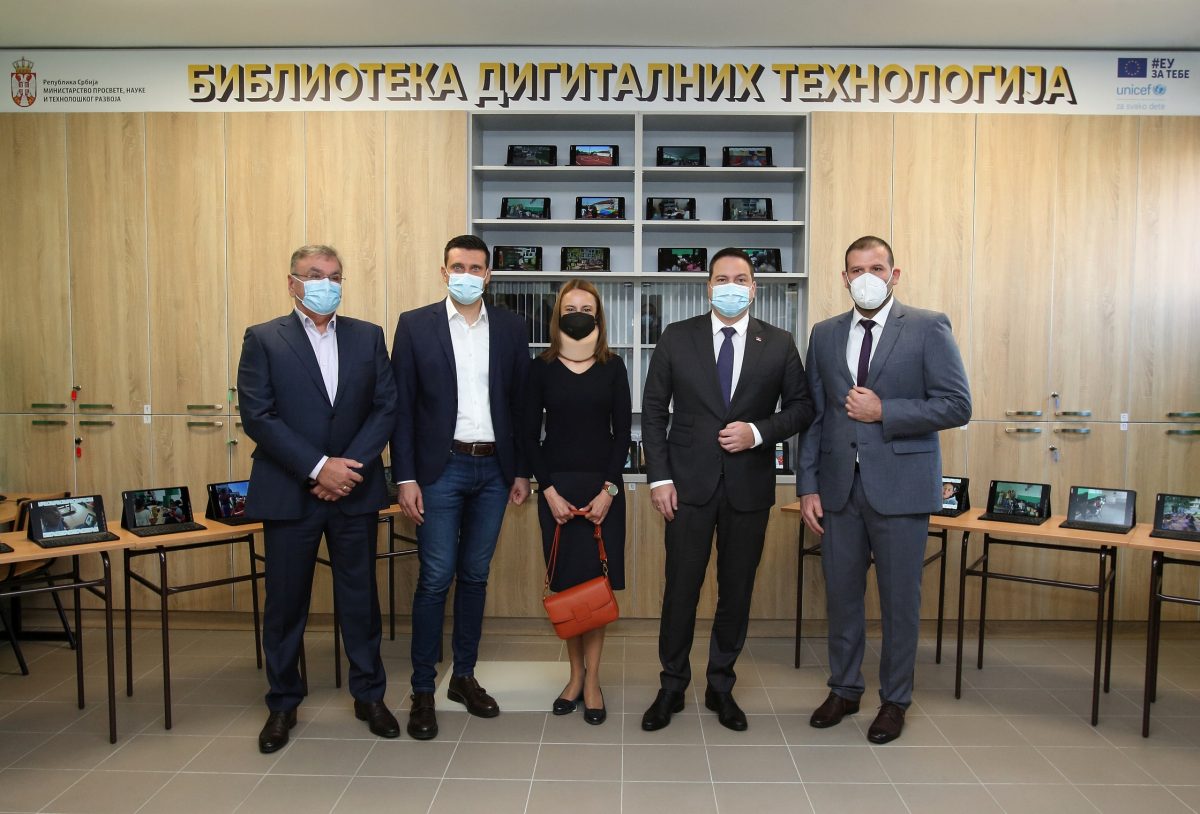Telenor and Unicef provided 2200 Internet SIM cards and 310 modems for schools in 30 municipalities

Smederevska Palanka, October 21st 2021 – Branko Ružić, Minister of Education, Science and Technological Development, Goran Vasić, Director of Corporate Affairs at Telenor Serbia and Dejana Kostadinova, UNICEF Director in Serbia, delivered SIM cards and Internet modems to Darko Dimitrijević, director of the Elementary School “Olga Milošević” in Smederevska Palanka. Telenor, in cooperation with UNICEF, provides free internet for schools in 30 municipalities throughout Serbia.
First Deputy Prime Minister of Serbia and Minister of Education, Science and Technological Development Branko Ružić stated that an inclusive approach has led to the inclusion of more children from all vulnerable groups in the education system in Serbia. “One of the activities that are being implemented is the project “Bridging the digital divide in Serbia for the most endangered children”, which is being implemented in 30 schools, to enable the greatest possible accessibility of education. The Ministry of Education, Science and Technological Development, the European Union, and UNICEF have joined forces on this project to help the most vulnerable children in Serbia bridge the digital divide. For that purpose, various types of support to the educational system were provided and modern teaching aids and technical equipment were provided” said Ružić.
Bridging the digital divide will create an equal and inclusive approach to education while helping children and young people to develop digital skills that will prepare them for life in the 21st century, as well as for entering an increasingly competitive market of labor.
“We are proud that we were chosen to be among the 30 schools that are part of this important project. The equipment we received, along with raising the digital competencies of students and teachers, will significantly improve the work of the school, students will have the opportunity to work on modern tablets, and teachers and professional associates will work on modern laptops. This is significant support for us to build capacities and accelerate the modernization of our educational institution. We owe great gratitude to our ministry, UNICEF, the EU in Serbia, and now to Telenor, which gave us a valuable donation in the form of free internet. We will give our best to justify the trust we have received and we will be dedicated partners in the implementation of this important project” said Darko Dimitrijević, director of the elementary school Olga Milošević from Smederevska Palanka.
Telenor’s donation, which consists of 2,200 internet cards and 310 modems for internet access for 30 schools, will enable the creation of the necessary conditions for remote learning, regardless of where and in what conditions the students live.
“Most children adapted to the new reality during the pandemic, with the huge support of parents, teachers, and access to digital tools, but there are also those for whom it was a bigger challenge. The idea of this initiative is to provide the same conditions for everyone, because learning must not stop for any child, regardless of the circumstances around us. We believe that connectivity and access to communication services are the right way and we have been working on that together with UNICEF, as a strategic partner, for more than 10 years” said Goran Vasić, Executive Director of Corporate Affairs at Telenor.
Education and the transition to digital learning form the basis for building a crisis-resistant education system.

“UNICEF is working with the private sector to find the best solutions for children. This type of cooperation is reflected in our partnership with Telenor, which has been our dedicated partner for many years. I am glad that our partnership was encouraged by mutual vision. Through a partnership with UNICEF, Telenor will support bridging the digital divide by providing internet in 30 schools in Serbia so that all children, especially the most vulnerable, gain access to learning. I would like to thank Telenor for the generous donation of 2200 SIM cards and 310 modems. Our mutual goal is to increase the number of children who can access remote learning, to decrease losses in learning, and to advance learning outcomes for everyone“ said Dejana Kostadinova, UNICEF Director in Serbia.
Elementary school Olga Milošević is one of the schools that takes part in the project Bridging the Digital Gap in Serbia for the Most Vulnerable Children. The Ministry of Education, Science and Technological Development, the European Union, and UNICEF are working to bridge the digital divide for some of the most vulnerable children in Serbia by supporting the education system, providing open educational resources and technical equipment, and school activities aimed at improving children’s learning outcomes. By establishing “educational digital libraries” and “learning clubs” in selected schools “at-risk”, 900 teachers working in these schools will have the opportunity to strengthen their capacities. At least 12,000 children will benefit from this.